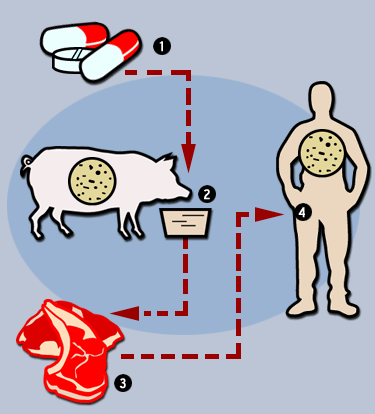 The following article about the homeopathic alternative to antibiotics for farm animals appeared on Truthout.org on October 25, 2013.
The following article about the homeopathic alternative to antibiotics for farm animals appeared on Truthout.org on October 25, 2013.
Please visit the Truthout link and give it a thumbs up — and forward it within your social networks!
The news has been buzzing lately about a recent CDC report that confirms a link between the routine use of antibiotics for livestock and growing bacterial resistance. Surprisingly, about 70 percent of all antibiotics used in the United States are given in low prophylactic doses to farm animals in an effort to ward off rampant disease on our mega feedlots. If the CDC is right, this practice is causing people to die in increasing numbers from infections that simply won’t respond to treatment anymore. The bacteria have evolved and become resistant to our drugs as fast as we can develop them.
This outcome has been brewing and hinted at for years, but our dependence on antibiotics has been difficult to break. Naturally, doctors are loathe to deny an antibiotic prescription to a patient who is eager for one. But when it comes to treating our livestock, perhaps we should think twice, especially if the outcome is harming us.
But is there another way?
The answer is yes and it may surprise you. This solution is used with success by organic farmers all over the world and by some conventional feedlots in Europe. It was also the subject of a 1999 study that showed the method gets superior results over prophylactic antibiotics. The technique also won’t lead to bacterial resistance, because rather than killing bacteria, it increases the natural resistance of animals to disease.
In September 1999, Albrecht and Schutte published “Homeopathy Versus Antibiotics in Metaphylaxis of Infectious Diseases: A Clinical Study in Pig Fattening and Its Significance to Consumers” in Alternative Therapies. The study compared outcomes for four randomly assigned groups of pigs that were given placebo, homeopathic treatment, a standard blend of antibiotics and other conventional drugs in a routine low prophylactic dose, or conventional drugs in a high therapeutic dose. There were 1440 pigs involved in the study, which took place at an intensive livestock farm in Germany. The primary outcome measured was the incidence of respiratory disease, a common problem for pigs on such farms.
The results were both significant and startling: Homeopathic treatment was far superior to prophylactic doses of antibiotics in preventing respiratory disease. Prophylactic antibiotic treatment made it only 11 percent less likely (than placebo) that the pigs would become sick. But homeopathic remedies made it 40 percent less likely. When the antibiotics were raised to therapeutic levels, it became 70 percent less likely that the pigs would become diseased.
Clearly, it is impossible to keep animals medicated at high therapeutic levels of antibiotics all of the time. Even at lower prophylactic levels, the use of these drugs is becoming a societal health problem. This study showed that a form of medicine that many believe is mere placebo — and therefore unlikely to cause any effect in pigs — provides a much safer and more effective solution than prophylactic antibiotics.
Organic farmers worldwide already know this and have used homeopathic remedies successfully for many years. For example, in this report aired on New Zealand television, Tinneke Verkhade, a nurse and homeopath living in New Zealand, describes how she has taught hundreds of dairy farmers to use homeopathic medicines to help their herds, and how homeopathy is a primary tool used by organic farmers all over her country.
Perhaps even more surprising, homeopathy has also successfully treated confirmed cases of deadly antibiotic-resistant MRSA (Methicillin-Resistant Staphylococcus Aureus). A paper published in the November/December 2009 issue of Explore: The Journal of Science and Healing, reports one case study. You can see the healing process in this YouTube video. It was filmed by award-winning filmmaker Laurel Chiten as part of her development of a new film about homeopathy, Just One Drop.
Science and experience on organic farms have now shown that we do have a safe and effective alternative to antibiotics for our animals, and even for ourselves. The question is, will we follow the evidence and take a chance on this controversial option? Isn’t it at least worth a try?




[…] in millions of people, left, right and centre. It is also of concern that antibiotics have been put into our food chain on so many levels as a preventative for common diseases that could be eradicated using better […]